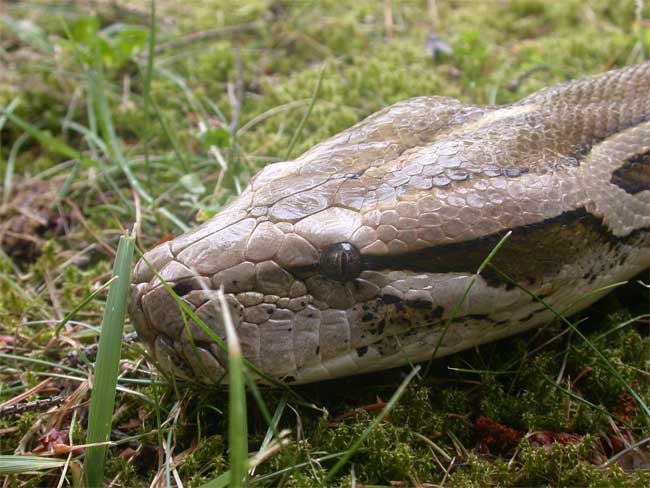Binge Eaters: Pythons Down Bones and All

If binge eating were diagnosed in the reptile world, Burmese pythons would be said to have major eating disorders. They eat infrequently but devour their prey whole, bones and all.
"Juvenile pythons normally eat every week, while adults can have a meal every month and can even stop feeding for several months under certain circumstances," said study co-author Jean-Herv? Lignot of Louis Pasteur University in France.
But what good could the bones be?
A new study finds the snakes are equipped to suck the calcium from their meal's skeleton, making for a more nutrition-packed snack.
"They are therefore physiologically fine tuned to cope with prolonged fasting, re-feeding on large meals, and intense digestion and nutrient absorption," Lignot said.
The research, which was presented last weekend at the annual meeting of the Society of Experimental Biology in Glasgow, Scotland, shows just how fine-tuned the snakes are when it comes to getting the most out of food.
In the study, Lignot and Robert Pope of Indiana University South Bend monitored shape and temperature changes of the guts of Burmese pythons before and after they ate a meal. Soon after feeding, the replication and death of cells in the snakes' gut tissues went into overdrive as new cells formed and worn-out cells vanished. The scientists describe the process as a remodeling of the stomach and intestine to prepare for the next fasting and feeding cycles.
Get the world’s most fascinating discoveries delivered straight to your inbox.
An analysis of the gut contents within hours of the snakes' feeding showed small particles that had come from the skeletons of their prey.
The scientists discovered a new cell type responsible for breaking down the boney bits for digestion. Shaped like golf tees, the specialized cells degrade the particles before releasing the elemental components into the bloodstream.
They suggest this process allows pythons to optimize their absorption of the bone's calcium from their meals.
- Images: Snakes of the World
- Video: How Does a Snake Swallow a Larger Snake?
- Top 10 Deadliest Animals
Jeanna Bryner is managing editor of Scientific American. Previously she was editor in chief of Live Science and, prior to that, an editor at Scholastic's Science World magazine. Bryner has an English degree from Salisbury University, a master's degree in biogeochemistry and environmental sciences from the University of Maryland and a graduate science journalism degree from New York University. She has worked as a biologist in Florida, where she monitored wetlands and did field surveys for endangered species, including the gorgeous Florida Scrub Jay. She also received an ocean sciences journalism fellowship from the Woods Hole Oceanographic Institution. She is a firm believer that science is for everyone and that just about everything can be viewed through the lens of science.


